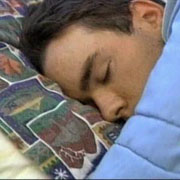VOA标准英语2011--Study: Sleep Disorders Widespread Among Police
搜索关注在线英语听力室公众号:tingroom,领取免费英语资料大礼包。
(单词翻译)
Study: Sleep Disorders2 Widespread Among Police
A new study has found that four out of 10 North American police officers surveyed have some sort of sleep disorder1. The researchers say the result can be impaired3 job performance, as well as a variety of health problems.
Charles Czeisler, a leading sleep researcher at Harvard Medical School and Brigham and Women's Hospital in Boston, screened police officers in the United States and Canada for possible sleep disorders.
"Forty percent of the nearly 5,000 police officers we studied screened positive for at least one sleep disorder," Czeisler said. "In this group of thousands of police officers, we found that one-third of them screened positive for obstructive sleep apnea."
That made apnea the most common sleep disorder by far.
In obstructive sleep apnea, a person repeatedly stops breathing for a brief moment during sleep. That interrupts sleep and often makes it impossible to get the deep sleep you need to be fully4 rested.
This study found both health and job consequences for police officers with sleep disorders.
 |
| Rotating shifts have something to do with the large number of police officers with sleep problems. |
"Those who screened positive for obstructive sleep apnea had a 61 percent greater odds5 of having diabetes6 and had a 148 percent increased odds of reporting that they had been diagnosed with depression. They also had a 22 percent greater odds of having an occupational injury," Czeisler said.
Rotating shifts have something to do with the large number of police officers with sleep problems. Working days one week and nights the next can scramble7 anyone's sleep. But Czeisler says that's not the only cause.
"The single greatest risk factor for obstructive sleep apnea is obesity8. And in fact we found that four out of five police officers were overweight or obese9."
One of the agencies in this study, the Massachusetts State Police, had much lower rates of obstructive sleep apnea. Their cops also had a significantly lower rate of obesity than other officers in the study. Czeisler says Massachusetts required its state troopers to pass a fitness test, and equipped each police barracks with a fitness center.
"They also made it a requirement that every state trooper spend an hour exercising on each one of their shifts. And that was paid time to work out in those gym facilities."
The researchers say they think the fitness program resulted in lower rates of obesity. That, in turn, could help reduce the rate of sleep apnea. The Massachusetts program could become a model for other police agencies to reduce obesity rates and sleep apnea among their officers.
 收听单词发音
收听单词发音 




